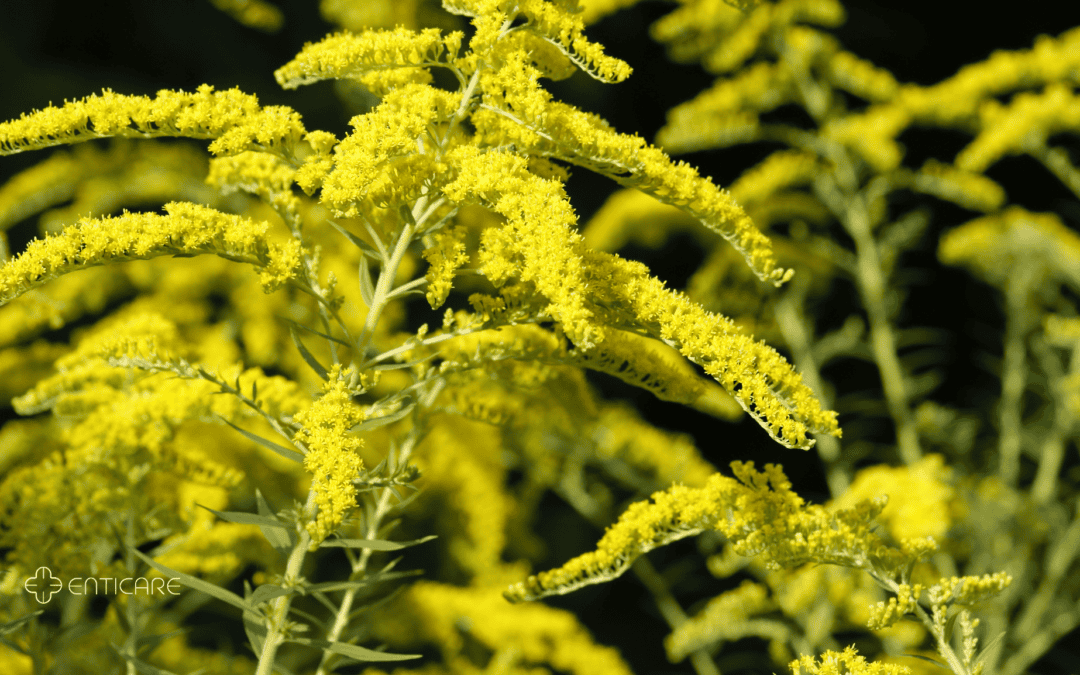As summer fades and fall approaches, many people welcome the cooler weather and beautiful foliage. But for allergy sufferers, autumn can bring a new wave of sniffles, sneezes, and itchy eyes. If you experience allergy symptoms in the late summer and fall, you might be surprised to learn the culprit is the goldenrod weed.
Goldenrod is a common native plant found throughout North America. It’s known for its bright yellow flowers that bloom in late summer and early fall. While goldenrod often gets blamed for fall allergies, it’s actually not the main culprit. The real allergy trigger is ragweed, a different type of weed that pollinates at the same time as goldenrod. Ragweed pollen is carried by the wind, and since it’s released around the same time as goldenrod flowers bloom, people often mistakenly blame goldenrod for their allergy symptoms.
Origin: Native to North America
Goldenrod is native to North America. There are over 100 species of goldenrod.) found throughout the continent, from Canada to Mexico. As part of the native plants in North America, goldenrod plays a crucial role in attracting pollinators, serving as natural bird food, and providing habitat for native bees and insects.
Season
Goldenrod allergy symptoms typically occur in late summer and fall, from August to November, which coincides with ragweed pollen season. Goldenrod displays small, bright yellow flowers in dense clusters on top of tall stems from July through September.
Signs and Symptoms of Solidago (Goldenrod)
If you have a ragweed allergy, you might experience these common symptoms when goldenrod is in bloom:
- Runny or stuffy nose
- Itchy, watery eyes
- Sneezing
- Coughing
- Scratchy throat
- Headaches (in some cases)
Causes of Goldenrod Allergy
As mentioned earlier, goldenrod itself doesn’t cause allergies. The culprit is ragweed pollen, which is released at the same time as goldenrod blooms. When you inhale ragweed pollen, your immune system mistakenly identifies it as a threat and triggers an allergic response, leading to the frustrating symptoms mentioned above.
Prevention of Rough Goldenrod
Here are some tips to minimize your exposure to ragweed pollen and alleviate allergy symptoms during goldenrod season:
- Track pollen counts: Check daily pollen forecasts and limit outdoor activities when ragweed pollen counts are high.
- Stay indoors during peak pollen hours: Mornings are generally the worst time for ragweed allergies.
- Keep windows closed: Especially during peak pollen times.
- Change clothes after being outdoors: Pollen can cling to your clothes, so take them off and wash them after spending time outside.
- Shower before bed: This removes pollen from your hair and skin.
- Use air purifiers: Air purifiers with can help trap pollen indoors.
Risk Factors
While anyone can develop a ragweed allergy, certain factors can increase your risk:
- Family history of allergies: If you have a family history of allergies, you’re more likely to develop allergies yourself, including ragweed.
- History of hay fever: People with hay fever are more prone to develop allergies to other airborne allergens like ragweed pollen.
- Asthma: Ragweed pollen can worsen asthma symptoms.
Treatment
There’s no cure for ragweed allergy, but several treatment options can manage your symptoms and improve your quality of life:
Over-the-counter medications: can help alleviate allergy symptoms like itchy eyes, runny nose, and sneezing. Decongestants can help clear nasal congestion.
Nasal corticosteroids: These prescription medications can effectively reduce inflammation in the nasal passages, offering long-term relief.
Allergy shots (immunotherapy): This long-term treatment involves gradually increasing your exposure to ragweed pollen over time, desensitizing your immune system and reducing your reaction to the allergen.
Living with ragweed allergies can be frustrating, but with proper knowledge and management strategies, you can enjoy the beauty of fall without the misery of allergies. This blog is for informational purposes only and should not be taken as medical advice. Always consult with a healthcare professional for diagnosis and treatment of allergies. Wondering How to Improve Your Well-being? Enticare Has Answers. Call 480-214-9000!

